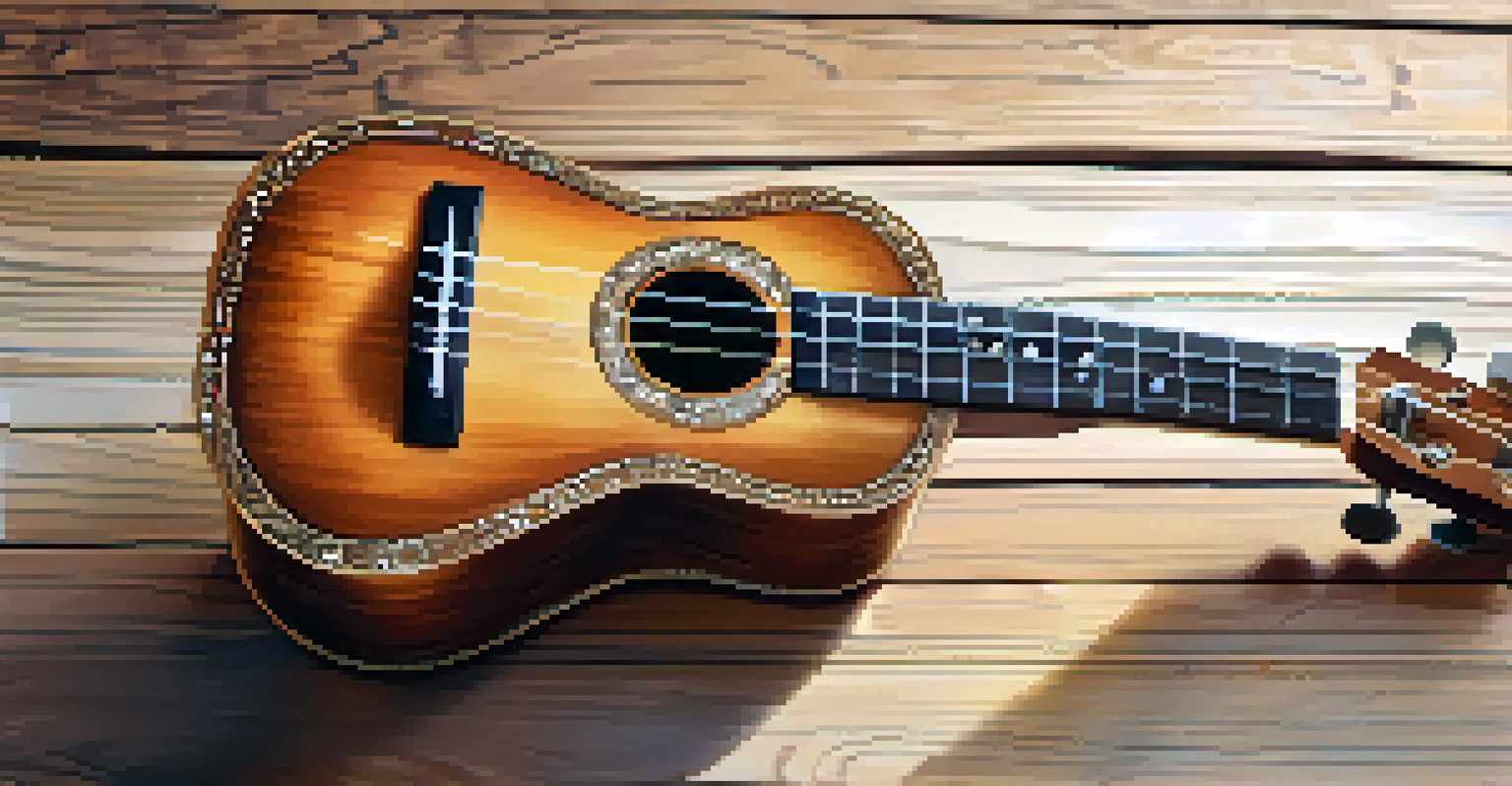The Ukulele's Influence on Indie Films: A Musical Evolution

The Ukulele: A Brief History and Its Unique Sound
The ukulele, a small four-stringed instrument, originated in Hawaii in the 19th century. Its bright, cheerful sound quickly charmed musicians around the world, making it a favored choice for various genres. The instrument's portability and affordability contributed to its popularity, allowing it to be embraced by diverse cultures and musical styles.
Music is the shorthand of emotion.
Unlike other string instruments, the ukulele has a distinct, lighthearted tone that evokes feelings of joy and nostalgia. This unique sound has made it a staple in folk and indie music, often associated with relaxed summer vibes or poignant storytelling. Its ability to convey deep emotions with simplicity has made it a favorite among indie filmmakers.
As indie films often seek to create a specific atmosphere or emotional response, the ukulele's sound fits perfectly. It can underscore a scene's lightheartedness or provide a bittersweet backdrop, making it an invaluable tool for filmmakers looking to connect with their audience on an emotional level.
The Rise of the Indie Film Movement
The indie film movement gained momentum in the late 20th century, driven by a desire for creative expression outside mainstream Hollywood's constraints. Filmmakers began to explore unique storytelling methods, often using innovative soundtracks to enhance their narratives. This period saw a growing appreciation for intimate, character-driven stories that resonated with audiences.

With the rise of technology, such as affordable cameras and editing software, aspiring filmmakers could create and share their work more easily. This democratization of filmmaking allowed new voices to emerge, often blending genres and styles. The ukulele's accessibility and charm aligned perfectly with this trend, becoming a popular choice for indie soundtracks.
Ukulele's Unique Sound in Film
The ukulele's bright and cheerful tones make it an ideal instrument for evoking emotions and enhancing storytelling in indie films.
Indie films often reflect personal experiences and cultural narratives, and the ukulele serves as a perfect musical companion. Its versatile nature allows it to fit into various scenes, from whimsical moments to reflective pauses, enhancing the overall storytelling experience for viewers.
Iconic Films Featuring the Ukulele
Several indie films have showcased the ukulele, leaving a lasting impact on audiences. Movies like '500 Days of Summer' and 'The Descendants' feature ukulele-driven soundtracks that perfectly capture their characters' emotional journeys. These films have not only popularized the instrument but also highlighted its ability to evoke specific moods and themes.
The best way to predict the future is to create it.
In '500 Days of Summer,' the ukulele plays a crucial role in setting the film's light and whimsical tone. Its catchy melodies accompany key moments, enhancing the viewer's emotional connection to the story. Similarly, 'The Descendants' uses the ukulele to underscore the protagonist's struggle, providing moments of levity amidst the drama.
These films showcase how the ukulele can elevate storytelling, creating a memorable auditory experience. By integrating this instrument into their soundtracks, filmmakers can craft a unique atmosphere that resonates with audiences long after the credits roll.
The Ukulele's Role in Evoking Emotion
Music has a profound impact on our emotions, and the ukulele's sound is no exception. Its bright and cheerful tones can instantly lift spirits, while its softer melodies often evoke feelings of nostalgia or melancholy. This emotional versatility makes the ukulele an ideal choice for indie films, which often aim to create a strong emotional connection with viewers.
When paired with poignant scenes, the ukulele can heighten the emotional stakes, drawing audiences deeper into the narrative. For instance, a tender moment between characters can be amplified by a gentle ukulele melody, making the experience more immersive. This capability to evoke a spectrum of feelings is why filmmakers increasingly turn to this charming instrument.
Indie Film Movement and Creativity
The indie film movement encourages unique storytelling, with the ukulele serving as a popular choice for soundtracks that resonate with audiences.
Moreover, the ukulele's simplicity allows for a direct connection with the audience. Unlike more complex instruments, its straightforward sound can resonate with a wide range of people, making it a universally relatable choice for storytelling in film.
Cultivating a Sense of Community Through Music
One of the appealing aspects of the ukulele is its ability to bring people together. Community ukulele groups and workshops have flourished, encouraging collaboration among musicians and fostering a sense of belonging. This communal spirit is mirrored in the indie film community, where collaboration and shared creativity are paramount.
Many indie filmmakers incorporate the ukulele into their projects not just for its sound but also for its cultural significance. The instrument represents a grassroots approach to music, echoing the indie ethos of creating art that resonates with the everyday person. This connection enhances the authenticity of the films, making them more relatable to audiences.
By using the ukulele in their soundtracks, filmmakers tap into this sense of community, inviting viewers to share in the experience. Whether it's a local film festival or an online screening, the shared appreciation for the music can create lasting connections among audiences, further enriching the indie film landscape.
The Ukulele in Modern Indie Film Scores
As indie films continue to evolve, the incorporation of the ukulele remains a popular trend. Modern composers are finding innovative ways to blend the ukulele with other instruments, creating unique soundscapes that enhance narrative depth. This experimentation reflects the continual growth of the indie film genre, where boundaries are constantly pushed.
Composers like Jonathan Groff and Lyle Workman have successfully integrated the ukulele into contemporary scores, showcasing its versatility. Their work illustrates how the instrument can blend seamlessly with orchestral arrangements or stand alone in poignant moments, highlighting the emotional core of a film. This adaptability makes the ukulele a valuable asset in modern filmmaking.
Community Spirit Through Music
The ukulele fosters a sense of community among musicians and filmmakers, enhancing the authenticity and relatability of indie films.
The ongoing use of the ukulele in film underscores its lasting influence in the industry. As filmmakers explore new avenues of storytelling, the ukulele continues to resonate, proving that even the simplest instruments can leave a profound impact on cinema.
The Future of the Ukulele in Indie Films
Looking ahead, the ukulele is poised to maintain its relevance in the indie film scene. With the growing popularity of the instrument among new generations of musicians and filmmakers, we can expect to see even more creative uses in upcoming projects. The charm and accessibility of the ukulele make it a perfect fit for storytelling in a rapidly changing landscape.
As indie filmmakers push boundaries, the ukulele will likely continue to evolve within musical scores. We may see hybrid styles emerge, combining traditional ukulele sounds with modern genres, further enriching the auditory experience of films. This innovation will keep the ukulele fresh and exciting for both creators and audiences.

Ultimately, the ukulele's enduring appeal lies in its ability to connect people through music and storytelling. As more filmmakers embrace this instrument, audiences can look forward to witnessing its unique influence on the indie film industry for years to come.